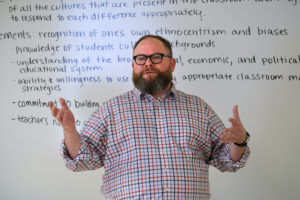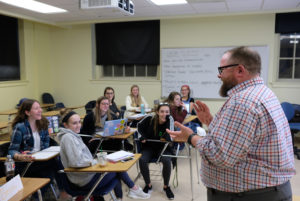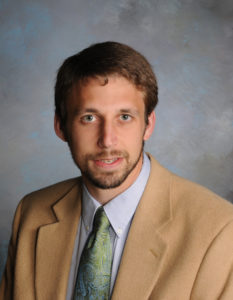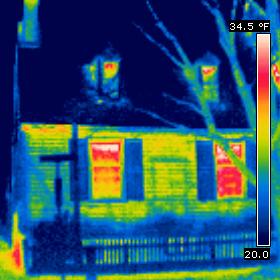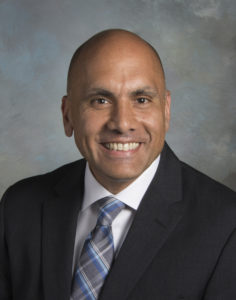College of Education Associate Professor John Broome keeps his worst student course evaluation from his first year at UMW displayed in his office, right beside his teaching award. For him, it’s a constant reminder that he should always strive for improvement as an educator.
Broome believes that American educators need to focus their attention on being better teachers to children from all backgrounds. In the classroom, he and his students engage in discussions about race and racism, equity, privilege, implicit bias, youth trauma and poverty to understand the complex web of issues affecting schoolchildren across Virginia and the United States.
“When you have students impacted by these factors, then teaching, learning and classroom environments look different. You have to meet your students where they are with positive expectations for their ability and growth,” said Broome, who has a Ph.D. in education from the University of Virginia, an M.Ed. in curriculum and instruction from George Mason University and a B.A. in government from The College of William and Mary.
That’s why Broome, whose research focuses on social justice, critical race theory and civic education, was eager to participate in Courageous Conversations, a new video series featuring UMW faculty discussing diversity and inclusion. But he wants his students to think of these topics not as courageous but normalized and present in every classroom.
“We need to work toward having a more open, honest dialogue about the lived and historical experiences of all peoples in our country,” said Broome, who has taught secondary social studies in public and private schools across Virginia. “When more than half of students in our country are Black, Indigenous and People of Color, all students should not just learn more about these histories, but from their own voices as well.”
Q: Are there are any projects you enjoy having your students do?
A: My students enjoy the culture quilt project, in which they divide a poster board into 16 squares like a quilt. They use pictures, words and phrases to explore their family histories, their professional and personal cultural selves and other cultures that are unfamiliar to them. It’s an opportunity for students to self-interrogate, understand who they are and become more accepting of others.
Q: How did you come to direct the Hungry Brains! program at Hazel Hill?
A: I’ve been involved since 2012. It’s an after-school program for economically disadvantaged K-8 students in downtown Fredericksburg that is entirely UMW student-run. It empowers student leadership responsibilities while addressing the academic needs of children in this community. We’ve also helped with fundraising. On Valentine’s Day 2018, my students and I sold candy-grams on UMW’s campus so that Hazel Hill students could open their first savings accounts as part of a financial literacy project. I’ve raised money to help build their library and purchase new technology for the Center.
Q: You encourage your students to use culturally responsive teaching practices. How does that improve learning in the classroom?
A: This centers culture in all aspects of learning. It includes having high expectations of all students; being more student-centered; becoming more culturally competent; building the relationships between schools, families and community; learning the contexts of diversity and cultures; and reframing the curriculum. My work is mostly on the curriculum and what it means when students don’t see their multiple identities reflected in what they are learning.
Q: What is one piece of advice you give to aspiring educators to make their classrooms more inclusive?
A: How you teach is often more important than what you teach. You never know what is going on in the life of a child.
Q: Who or what inspires you?
A: My wife inspires me. She was a first-in-family college graduate from a small town in Oregon. Multiple degrees later, she is a dean at another university. She’s absolutely brilliant.
Q: What would you be doing if you were not a professor?
A: I would be an international travel and food writer, a chef or an electronic dance music DJ. In addition to going to EDM shows regularly in D.C. around the United States, my wife and I are traveling to festivals in Holland, Finland and Belgium this year.
Q: What would people be most surprised to learn about you?
A: In college, I had a pet duck named Clyde, who snored when he slept on you. It was adorable.
Q: Are there any mottos that you live by?
A: “I love America more than any other country in this world, and, exactly for this reason, I insist on the right to criticize her perpetually.” ~James Baldwin
Q: What books are you reading right now or have you read recently that inspired you?
A: “We Want to Do More Than Survive: Abolitionist Teaching and the Pursuit of Educational Freedom” by Bettina L. Love, an associate professor at the University of Georgia.
